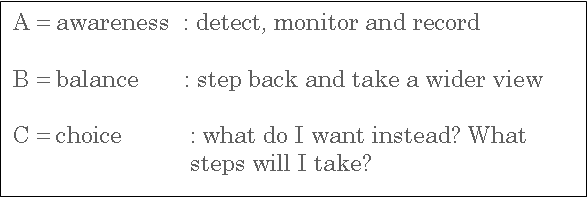In an earlier article I explored the question of what is stress really. This gave insights on how to avoid stress. Here we will look at detecting and coping with stress. This is the approach that I use in my stress workshops at a local NHS hospital trust.
Stress can creep up on you, and to catch it early you will need a method to detect it, so that you are aware of it. That’s the first step in my ABC approach to detecting and avoiding stress.
Awareness is about paying attention to emotional and physical changes, asking others who know you, maybe completing a questionnaire, and possibly seeing the doctor if you are seriously concerned.
There are various self-analysis questionnaires you can do, ranging from the quick and simple to the more formal. I have listed some with links at the end of this article.
A good idea is to track the symptoms that you are experiencing month to month. Use the two tables of physical and emotional symptoms that I gave in my previous article, simply circle those which apply to you, then repeat in a month’s time. Are there more of fewer circles?
Balance prompts you to get a wider perspective. Stress can often arise when we get too drawn into an issue, and we lose sight of other aspects in life which, on balance, you may realize is not really so bad. Mentally “step out” and imagine looking at yourself from above any situation which is bothering you. How does it look from there? What can be learnt? Also, look at other aspects of your life, and other activities that you take part in. Let yourself recall past good times, or upcoming events that you are looking forward to.
Choice is about willingness to taking back some power. Usually we know what we don’t like in life, but we are less good at actually thinking through what we really would like our own life to be like, in any useful practical detail. So after you have stepped back and calmed down, begin to imagine and note down what you would actually like to have your life look like, in detail.
Even more importantly, ask yourself what did you do bring it about and to keep it? It’s no good waiting for someone else to deliver you a happy stress-free life; other people have their own worries and concerns to deal with. A good starting reframe is the so-called serenity prayer:
Further Analysis
If you really want to get serious and resolve the root of your stress, then these are the kinds of questions I would initially ask you:
- What precisely is the problem that you are experiencing? What actual factual evidence do you have or what are the symptoms?
- What situations trigger it off or makes it worse, and what makes it better? When did it start? What was happening then in your life around that time? What feelings and emotions were associated with those situations? What is the relationship of that to your present situation?
- If you tracked these feelings way back in your life, what were you earliest memories of having even the faintest of feelings like these?
- Ask you inner, subconscious mind: What do I need to know or become of aware of in order to resolve this? What do I need to change in my life? What aspects of my life would I refuse to change?
- What are my greatest fears or concerns in life? (These concerns may even be the source of your greatest motivations in life.)
Resources
These are examples of tests to detect and measure stress:
Simple ten-question test to assess how stressed you are
Stress vulnerability test for the impact of Life Events


